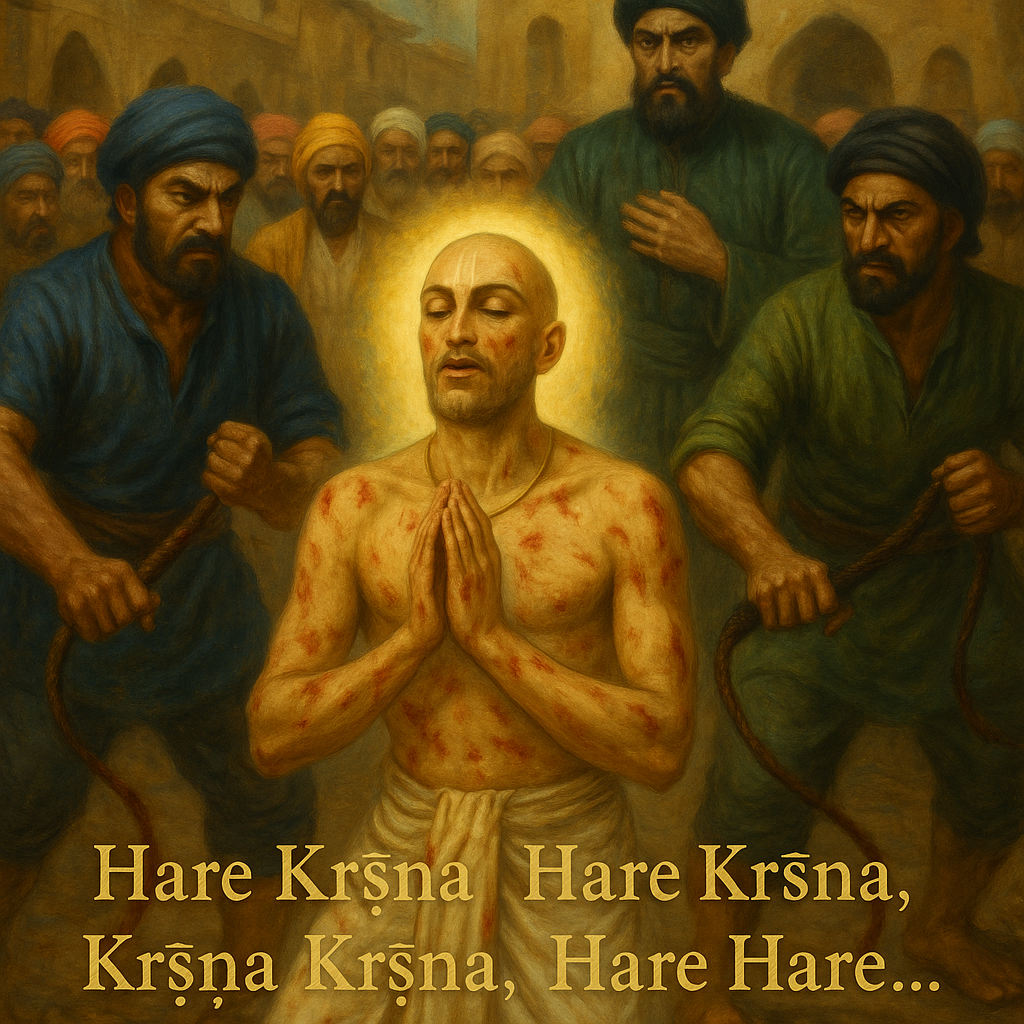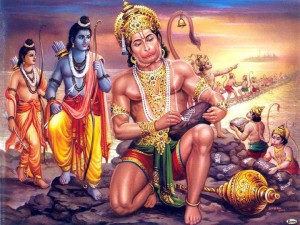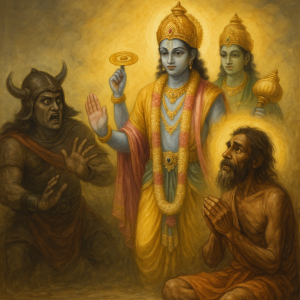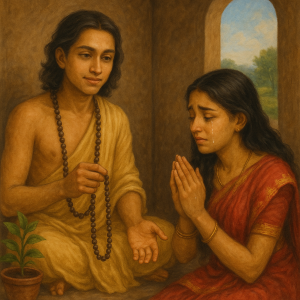A Threat to False Religion
In the days when Lord Caitanya was preparing to appear, Śrīla Haridāsa Ṭhākura, though born in a Muslim family, had become the most exalted chanter of the holy name of Lord Kṛṣṇa. He had fully embraced a life of bhakti and had no interest in material comforts or social prestige. Day and night, he chanted the mahā-mantra, unmindful of hunger or sleep.
This spiritual power began to disturb the orthodox Muslim authorities, who considered Haridāsa an apostate and a threat to their rule. “He was born a Muslim,” they said. “Now he dares to chant Hindu names and live like a saint? We must punish him, or others will follow!”
The qazi ordered Haridāsa to be brought to court and interrogated before a crowd.
A Courageous Response
In front of a hostile crowd and the magistrate, Haridāsa was asked sternly, “Why do you chant these Hindu names? Return to your religion, or face death!”
Haridāsa replied without fear, “The holy name of Kṛṣṇa is not Hindu or Muslim—it is eternal, beyond birth and death, beyond caste and creed. Whether one is born in a brāhmaṇa’s house or in a mleccha family, chanting the name of the Lord purifies all. I cannot give up this chanting—not even if you cut me to pieces.”
The qazi was enraged. “Very well. Let him be whipped in twenty-two marketplaces. Let the people see what becomes of those who abandon our religion.”
Divine Protection Amidst Torture
The executioners led Haridāsa into the streets and began to whip him mercilessly, marketplace after marketplace. His flesh was torn, blood flowed freely, but his lips moved ceaselessly:
“Hare Kṛṣṇa, Hare Kṛṣṇa, Kṛṣṇa Kṛṣṇa, Hare Hare…”
The guards became afraid. “He is not dying! Any man would have perished by now. But he chants peacefully, as if untouched.”
In truth, Kṛṣṇa was personally protecting Haridāsa. The Lord bore the pain Himself so His devotee would not suffer. Invisible to all, He embraced Haridāsa’s body and covered him with His own touch.
The guards fell at his feet. “O saint! Forgive us! We were ordered to do this. But we cannot kill you.”
Haridāsa opened his eyes and said kindly, “Do not fear. I am not angry. You were only instruments. May the Lord bless you.”
Declared Dead and Thrown into the River
Ashamed, the executioners reported to the magistrate, “We could not kill him. He’s either a great saint or protected by divine power.”
Infuriated, the qazi ordered, “If he will not die, throw him in the river like a dead man!”
So they bound Haridāsa’s body and cast him into the Ganges. The people wept, thinking the saint had died.
But by the mercy of the Lord, Haridāsa floated to the surface, alive and well, and walked calmly back to his hut, resumed his japa, and glorified the holy name with even greater love.
The News Spreads
Word spread throughout the land: “A man was beaten in twenty-two marketplaces and survived! He chanted the name of God without stopping!”
Even the Muslim rulers became fearful. “This man is beyond ordinary. He is protected by the Lord.”
From that day forward, no one dared to trouble Haridāsa. He was recognized not by caste or lineage, but by his purity and devotion.
Lessons to Be Learned:
- The holy name protects the devotee even in the most extreme danger.
- Chanting with faith gives one fearlessness, even in the face of death.
- Haridāsa did not curse his tormentors, but forgave them and blessed them with bhakti.
- This story reveals the divine favor shown to those who surrender to the holy name completely.
“Even if I am cut into pieces, I will never give up the chanting of the holy name.” – Haridāsa Ṭhākura
Origin of the Story: This lila is found in Caitanya-bhāgavata (Ādi-khaṇḍa, Chapter 16) and referenced in The Divine Name, Caitanya-caritāmṛta (Ādi-līlā 3.50–3.52), and various hagiographies of Śrī Caitanya Mahāprabhu and His associates.



